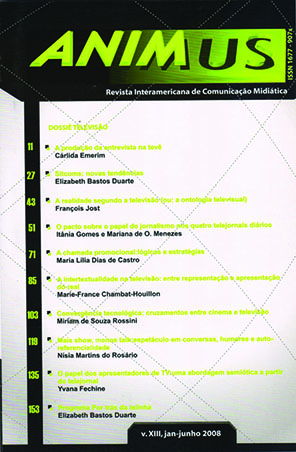A intertextualidade na televisão: entre representação e apresentação do real
DOI:
https://doi.org/10.5902/2175497790467Keywords:
Intertextualidad, Representación, PresentaciónAbstract
The paper presents a reflection inspired on the will to understand how intertextuality constitutes or even breaks with the purposes of televisuality, when this deals with the world. Intertextuality is a very vast field, and I will initially ask myself about its limits. In order to grasp the complexity of its functioning on television I will privilege one of its exemplary figures, citations, leaving aside allusions, references and plagiarism. Hence, analysis of a citation will provide information as to how television binds relations on the one hand with reality and on the other with fiction.
Downloads
References
AUSTIN, John L. Quand dire, c'est faire. Paris: Seuil, 1970.
DUARTE, Elizabeth Bastos. Televisão: ensaios metodológicos. Porto Alegre: Sulina, 2004.
BAZIN, André. Qu'est ce que le cinéma? Paris: Cerf, 1956.
COMPAGNON, Antoine. La seconde main ou le travail de la citation. Paris: Seuil, 1979.
CHARAUDEAU, Patrick. Les conditions d'une typologie des genres télévisuels d'information. Réseaux, n°81, CNET, p. 81-100, 1997.
CHAMBAT-HOUILLON, Marie-France. Compreender a citação nos programas de televisão. In: CASTRO, Maria Lília Dias de; DUARTE, Elizabeth Bastos. Televisão: entre o mercado e a academia II. Porto Alegre: Sulina, 2007. p. 137-156.
CHAMBAT-HOUILLON, Marie-France; WALL, Anthony Wall. Droit de citer. Paris: Bréal, 2004.
CHAMBAT-HOUILLON, Marie-France. Les doubles desseins de la citation télévisuelle. RS-SI, Montreal, v. 23, n° 1-2-3, p. 43-66, 2003.
GENETTE, Gérard. Palimpsestes. Paris: Seuil, 2003. Points.
Downloads
Published
How to Cite
Issue
Section
License
Copyright (c) 2024 Animus.Inter-American Journal of Media Communication

This work is licensed under a Creative Commons Attribution-NonCommercial-ShareAlike 4.0 International License.
The authors of texts approved by the referees of Animus - Inter-American Journal of Media Communication automatically concede, and without any charge, the right to the first publication of the submitted material.







